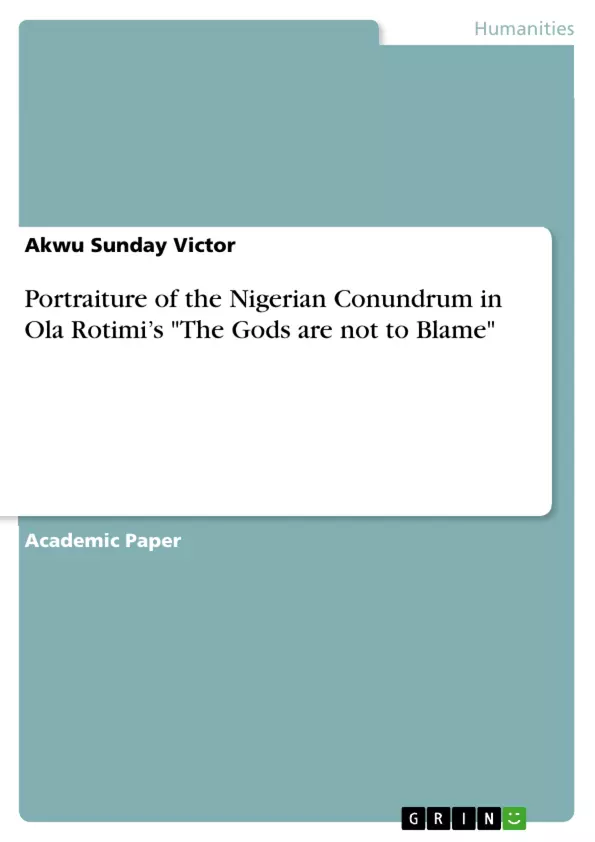This paper attempts reading Ola Rotimi’s "The Gods are not to blame" against the backdrop of the Nigerian dilemma in the contemporary times. The play first performed in the year 1968, in the heat of the Nigerian civil war is still relevant today. Many scholars viewed the work as a transplantation of Sophocle’s Oedipus Rex and underplay its powerful political message to the nascent Nigerian political class then and now. The paper examined the role of Odewale in the shaping of the Destiny of his society and how albeit with stint of tyranny champions the welfare of the state, taking blames for the decadence and the breakdown of law and cosmic order when found culpable. On the other hand, the contemporary Nigerian leaders are antithetical of Odewale, blame-games and outright refusal to be accountable, or step-down when found wanting; misappropriation, mismanagement of state and human resources are institutionalized on local and national scale. The paper above all, adumbrated some of the conundrums of Nigeria and proffered a number of useful ways by which the Odewale examples could be integrated into the Nigerian political morality, and the pitfalls to be avoided in a bid to move ahead into the state dreamt of on the 1st of October, 1960.
Table of Contents
- Introduction/Background to the Study
- The Gods are not to Blame as Adaptation
Objectives and Key Themes
This paper examines Ola Rotimi's The Gods are not to Blame in the context of contemporary Nigeria, exploring its relevance beyond its adaptation of Sophocles' Oedipus Rex. It analyzes how the play reflects and critiques leadership, responsibility, and societal conundrums within a Nigerian context.
- The role of leadership in shaping society's destiny
- The importance of accountability and responsibility in leadership
- The impact of corruption on societal well-being and development
- The relationship between leadership failures and societal challenges
- The search for solutions and the potential for change in Nigerian society
Chapter Summaries
- Introduction/Background to the Study: This chapter establishes the context for analyzing Rotimi's play by examining the role of writers in postcolonial societies. It discusses the challenges facing Nigeria, including corruption, militancy, and a lack of justice, highlighting the disconnect between the ruling class and the suffering populace.
- The Gods are not to Blame as Adaptation: This chapter focuses on the adaptation of the Oedipus myth into a Nigerian context. It highlights the cultural and historical differences between ancient Greece and Nigeria while emphasizing the universality of themes such as power, responsibility, and blame.
Keywords
This paper focuses on key concepts such as leadership, responsibility, corruption, societal conundrums, and the Nigerian dilemma. It explores themes of accountability, societal decline, and the potential for change through the lens of Rotimi's play and its historical context.
Frequently Asked Questions
What is the central theme of Ola Rotimi's "The Gods are not to Blame"?
The play explores leadership, responsibility, and the "Nigerian conundrum," using the Oedipus myth to critique political morality and accountability in Nigeria.
How does the character Odewale differ from contemporary Nigerian leaders?
Unlike many modern leaders who engage in "blame-games," Odewale is depicted as taking responsibility for the state's decadence when found culpable, despite his flaws.
Is the play just a simple adaptation of "Oedipus Rex"?
No, while it is a transplantation of Sophocles' work, it carries a powerful political message specifically tailored to the post-colonial Nigerian political class.
What are the "conundrums" of Nigeria mentioned in the study?
The study highlights corruption, mismanagement of resources, lack of justice, and the disconnect between the ruling class and the populace.
What can modern politics learn from Rotimi's play?
It suggests integrating accountability into political morality and avoiding the pitfalls of institutionalized misappropriation to achieve the nation's original dreams of independence.
- Citar trabajo
- Akwu Sunday Victor (Autor), 2014, Portraiture of the Nigerian Conundrum in Ola Rotimi’s "The Gods are not to Blame", Múnich, GRIN Verlag, https://www.grin.com/document/278207



